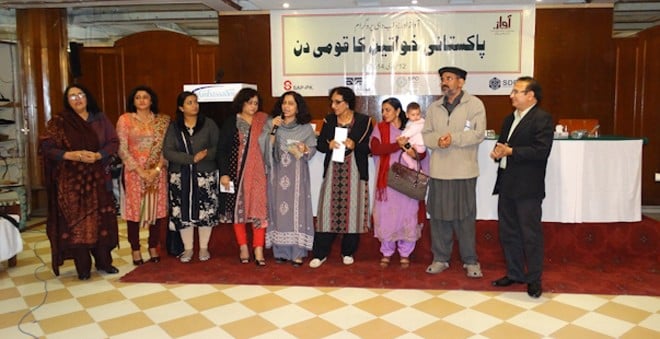

More than 200 women from different districts of Punjab get together in a local hotel to celebrate National Day of Pakistani Women. This is February 12. Activists at grassroots level dominate the gathering. This year’s highlight is domestic workers.
On this day, back in 1983, a group of women protested at Regal Chowk against ‘Law of Evidence’ that upheld the testimony of a male as equal to that of two females in a court of law. They were baton-charged and many were arrested. Feb 12 is officially declared as the National Day of Pakistani Women since then.
The day opens with a theatrical performance. A team of young women and men, all dressed in violet, enter the scene. The play is about the plight of a woman domestic worker and her daughter who helps her mother in the chores. They are underpaid and overworked. The worst befalls the mother-daughter duo with sexual assault on the girl. The woman is offered money by the employer to stay mum. Fearing slamming of theft charges on her, the woman tries to hide the incident of rape which leads to further complications. She blames her husband for lack of subsistence. Here, the play becomes intense.
Mid-play, the spectators are invited to take a role. A woman from the viewers volunteers to play the victim. The theatre becomes interactive.
A senior activist steps up to correct that had the girl informed her mother of the advances made by the employer’s son, she could have been saved. "There is a need to interact with our children, to inform each other in order to protect ourselves."
Vice president of the PML-N women wing enters the hall and gets the mike. "You cannot be heard until you raise your voice," she says.
The next scene is a TV talk show on the issue. Then come activists with placards, chanting "Stop violence on domestic servants," "Put an end to long duty hours" and "Social security is our right."
The play closes with a song sung by the cast -- "Ae aurat, ae dard ki moorat/ae aadhi abadi jaag (O woman, the picture of suffering/O half of the population, rise).
The theatre succeeds in evoking thought. Well Done Chanan!
Women in the hall are called to share rights issues with others. A woman associated with Awaz programme, comes forward and says: "I am from Sargodha, married to a man from a village in Attock where killing women in the name of honour was common. We raised voice against this practice. Now you don’t hear of such killings.
"Babies were delivered at home, now they are at government certified centres. Few mothers die or suffer from complications because there is a law to nab people if mothers die at home during child birth."
Another woman comes forward and says, "My daughter worked as domestic help at someone’s house for five months. They didn’t pay her at all. The employer rather turned her out after levelling theft charges against her."
One wonders if she would get help in real terms -- whether somebody will help her recover the money now that she has raised her voice.
Eminent women in the civil society speak on the issue. Bushra Khaliq who has been working for home-based workers and domestic help says, "You do not get rights without struggle. If we want to restore human dignity, we will have to break the status quo. We are dependent on domestic help. Is their welfare close to our heart? It ought to be. Our workers/labourers’ condition will change when the employers’ ill-intentions will change. There are about a crore domestic women workers in Pakistan," she says.
Going back to the play that has quite an impact on the viewers, Bushra says, "Do not criticise the girl when she is violated. There is a need to identify the oppressor rightly. Children should not work at anyone’s house. A law is needed here to stop them from working as domestic help.
"The Punjab government ensures the wedding functions end at 10pm. It can put an end to children working as domestic help. When the government wants to ensure something, it does. It’s time the government put a ban on child domestic labour," she says.
Three girl servants were reported killed last month in Lahore alone.
Shabnam Rasheed of South Asia Partnership (SAP) stresses on registering our domestic servants with union councils. "Raise your voice against wrong."
Aimal Khattak of Sungi says there are over 30,000 domestic workers in Islamabad alone and the first ones to be organised. Punjab government has passed a law for domestic workers and the law is under discussion in KP. Change is slow but things are progressing in the domain.
Aima Mehmood of Working Women Organisation (WWO) informs that the ILO convention defines domestic worker as someone who works for eight hours. Our domestic worker works at four places. We need to keep this in mind while formulating any policy for domestic workers and while doing so, we need to consult both the domestic workers and employers.
The event closes with a song sung by the key speakers:
Tu khud ko badal, tu khud ko badal
Tab hi tau zamana badlay ga
Tu bolay gi, muh kholay gi, tab hi tau zamana badlay ga.
(Change yourself, change yourself/only then will the world change
When you will speak/only then will the world change)
SAP, SPO, WAF, Aurat Foundation SDPI and Sungi are all there on one platform, for one cause -- to restore the dignity of the domestic worker, in short human dignity. The government has pledged to train women domestic workers. That promises to improve the work scenario for them.